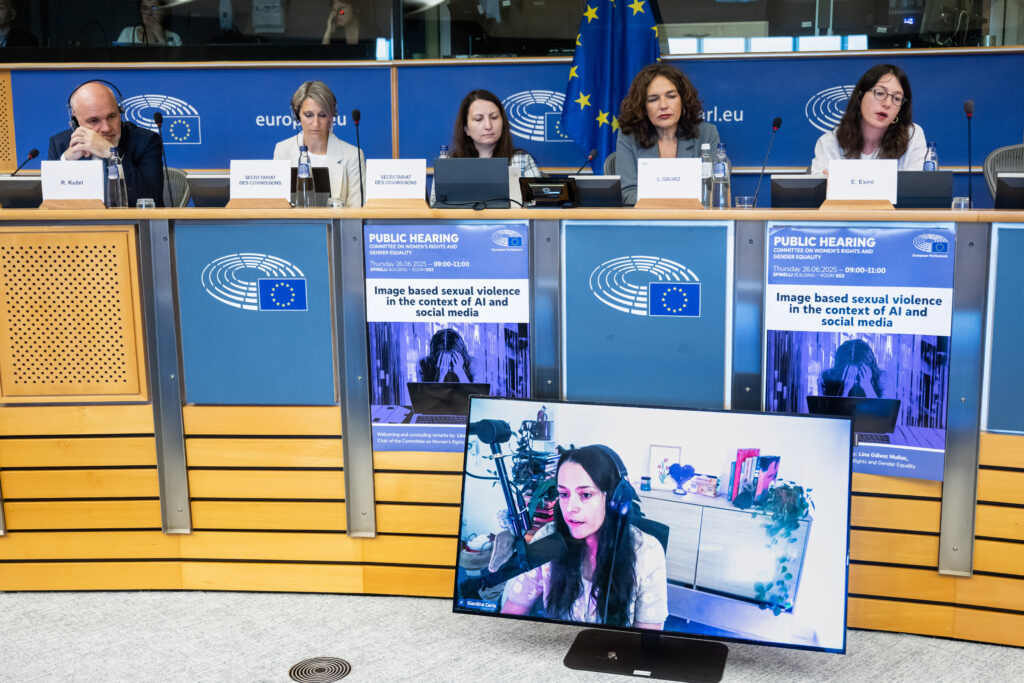A chilling picture of digitally enabled sexual violence emerged on Thursday, 26 June in the European Parliament, where MEPs gathered for a hearing organised by the Committee on Women’s Rights and Gender Equality (FEMM). The focus was the rise of image-based sexual violence in the context of AI and social media, specifically exploring the role of undressing apps and the responsibilities of platforms.
Opening the session, Lina Gálvez, Chair of the Committee, highlighted the effects of non-consensual image sharing. “It can have devastating effects, fear, shame or guilt, it can cost physiological and economic hurt,” she said, emphasising the need to explore the technical aspects of AI-generated content and platform practices. The hearing zeroed in on the disturbing proliferation of “undressing apps,” which are AI tools that are used to remove the clothes of individuals in images, deepfakes, and platform complicity.
Timely Online Hate
Mr. Rastislav Kužel of MEMO 98 laid out a stark assessment of the rise of gendered disinformation in Slovakia and Czechia between 2022 and 2025. In an analysis of over 8.600 social media posts, MEMO 98 found disinformation targeting female and LGBTQ+ figures surged around elections and key political events.
These campaigns deploy stereotypes, cultural biases, and emotional falsehoods to discredit women and silence diverse voices, contributing to democratic erosion. Key narratives include misrepresentation of gender policies, moral panic over “gender ideology,” and personal sexualized attacks.
Kužel also noted that the disappearance of Meta’s CrowdTangle tool, which provided valuable data access, was discontinued without explanation. “We now have Meta’s content library, but it is not that good,” he said.
You might be interested
Young voices, new tools
Opening with a touch of irony, when asked to keep an eye on the time, Emilia Esini answered, “Don’t worry, I’m trained to take up little space, I’m a woman”. Esini, from the Italian NGO Maghweb and coordinator of the EU-funded Elephant Talk project, presented efforts engaging young Europeans across Italy, Greece, Romania, and Portugal to gather and visualise data on online gender-based hate speech. The project trains youth workers in gender-sensitive data collection and fosters dialogue between youth and MEPs.
Esini highlighted the scarcity of gendered data on body shaming, fatphobia, and mental health impacts. Citing a study, she noted that 45% of men agree that posting one’s body online invites all kinds of comments, reflecting entrenched victim-blaming.
In her intervention, Emilia Esini highlighted the power dynamics behind body shaming and gender-based violence by quoting the American author Jude Ellison Sady Doyle: A monster is a supposed-to-be-subjugated body that has become threatening and voracious – a woman who is, in the most basic sense, out of (men’s) control.
From Twitch to tribunal
Speaking in the first person, Ultia, a Twitch streamer, shared the ordeal she faced after publicly condemning sexist remarks in 2021. The harassment she endured spread across multiple platforms, including Twitch itself, eventually leading to a court case in 2025, where three individuals were convicted.
I want to see accountability for platforms, that they remove the content as soon as possible – Ultia, Twitch streamer
Ultia described the exhausting toll the abuse took on her daily life: “I deactivate my camera when I take breaks. I second-guess my clothes.” She recalled a disturbing incident at a festival where, while on stage crossing her legs, someone manipulated the lighting to capture images of her underwear without her consent.

Despite the trauma, Ultia pursued justice. She relied heavily on volunteers from the Twitch community to compile evidence for her case, so extensive that “there wasn’t even a way to upload all the files.” Speaking specifically about the French judicial system, she said it “was not prepared” for such cases and urgently needs modernisation to keep pace with the digital world
Ultia emphasised the urgent need for platform accountability: “I want to see accountability for platforms, that they remove the content as soon as possible”.
GREVIO emphasises urgent action
Ellen O’Malley-Dunlop, Vice-President of GREVIO, the Council of Europe’s monitoring body for the Istanbul Convention, outlined the growing digital dimension of violence against women and the challenges it brings.
She shared striking figures that highlight the scale of the issue: “The pornography industry revenue is 97 billion dollars. Pornography sites receive 2.4 million visitors every 60 seconds.” O’Malley-Dunlop also pointed to the soaring consumption of violent content and revealed that many women face blackmail by former partners who threaten to share intimate images online.
The pornography industry revenue is 97 billion dollars. Pornography sites receive 2.4 million visitors every 60 seconds – Ellen O’Malley-Dunlop, Vice-President of GREVIO
Stressing the urgency of the problem, she echoed earlier speakers on the critical need for swift action: “The top priority is the removal of the content.” Summing up the gravity of the situation, O’Malley-Dunlop declared, “This is a global crisis, and it requires a global response.”
“There is nothing we can do”
Although she began with a lighthearted comment about being new to public hearings, the tone quickly shifted as MEP Eleonora Meleti shared her personal story as a victim of undressing apps. A friend had sent her AI-manipulated images so realistic they were indistinguishable from real photos. Meleti spoke about the overwhelming fear and shame such violations inflict on victims.
After consulting her lawyer, she was met with frustration: “There is nothing we can do,” she was told. Meleti made a forceful call for urgent recognition of this abuse as a crime and demanded stronger pressure on online platforms to act swiftly and decisively in removing such content.
The EU’s AI Act requires that AI-generated or manipulated content be clearly labelled when it “would falsely appear to a person to be authentic or truthful”. While this rule is limited in scope, it represents an important step toward holding platforms accountable and providing victims with stronger grounds for legal action.
MEPs call for stronger legislation and platform accountability
The panel sparked emotional reactions across party lines. Joanna Scheuring-Wielgus (S&D) underscored the problem’s universality: “No matter what country, we face this all the time. We should unite to force internet platforms to change the situation.” In the same issue, Margarita de la Pisa Carrión (Patriots for Europe) raised concerns about prosecuting perpetrators operating across borders, highlighting how online platforms enable offenders to act from anywhere in the world.
Maria Walsh (EPP) focused on accountability, asking how the EU can ensure platforms and app stores are held responsible for distributing AI-enabled undressing apps and deepfakes. She cited EU crime assessment reports warning that AI has accelerated the sophistication of criminal abuse, especially targeting teenage girls.
Echoing the call for stronger regulation, Elena Kountoura (The Left) urged the creation of a global legislative framework to guarantee swift content removal and immediate victim notification. Alexandra Geese (Greens/EFA) pointed instead to the Digital Services Act’s Article 34, which mandates platform risk assessments, pushing for full implementation rather than new laws, a stance that reflects growing frustration as Europe’s broader AI rules face delays.
“What’s illegal offline should be illegal online”
Alessandra Moretti (S&D) highlighted the gender bias embedded in technology itself: “These algorithms were built by men. That’s the problem,” she said, calling for sanctions against platforms that fail to act promptly. Anna Strolenberg (Greens/EFA) pressed for more comprehensive data, expanded initiatives, and questioned Twitch streamer Ultia about the judicial hurdles she faced.
That was the final message from MEP Heléne Fritzon (S&D), and one echoed across the hearing: “While we are sitting here, it’s happening now. What’s illegal offline should also be illegal online”. From digital stalking to AI-enabled abuse, the consensus was clear: European institutions are still playing catch-up to a new era of violence.











